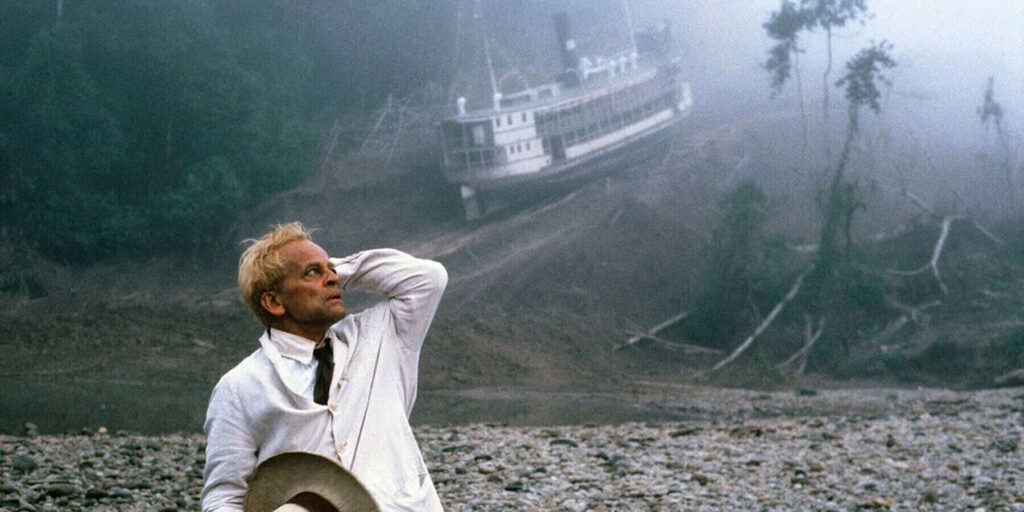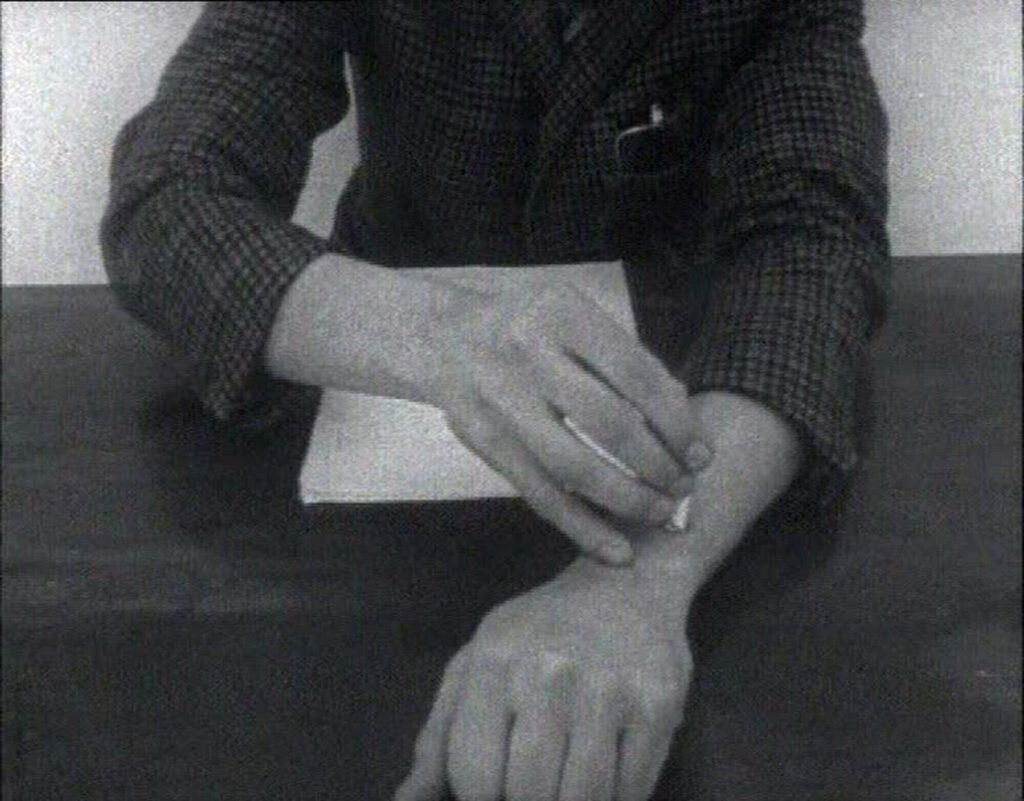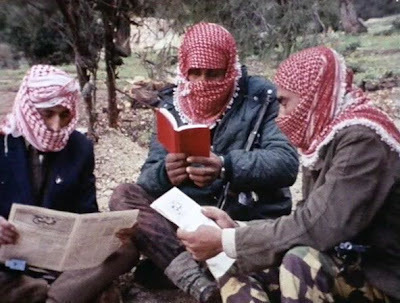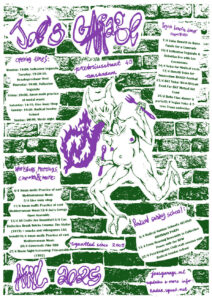Sunday March 30, 2025, Movie Night: Aguirre, the Wrath of God (Werner Herzog, 1972) * 94 minutes * In German with English Subtitles * doors open at 20:00 * intro & first film starts at 20:30.
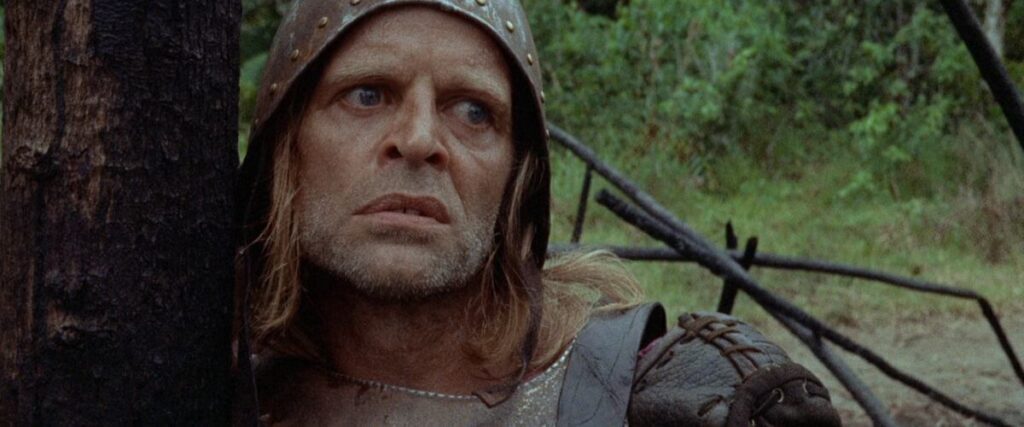 In search of El Dorado, in the mid-16th century, a gold-crazed contingent of Spanish conquistadors goes deep into the Peruvian rain forest, lead by Pedro de Ursúa (famed Portuguese filmmaker Guerra), second-in-command Lope de Aguirre (Kinski), Brother Gaspar (Negro), a rotund nobleman Fernando de Guzmán (Berling), among others, two females, Inés (Rojo), Ursúa’s wife and Florés (Rivera), Aguirre’s teenage daughter, and many Indian slaves. Most of the time, the team steers their route on rafts, but comes in for successive adversities in the hands of the unfathomable nature mother, one raft trapped by an eddy among the rapids causes a horrific aftermath, just when Ursúa commands to abort the scouting mission and backtrack, Aguirre precipitates a mutiny, keeps a wounded Ursúa as prisoner and puts Guzmán on the throne as the emperor of the new kingdom, because he firmly believes, they will find the gold, then their mission continues.
In search of El Dorado, in the mid-16th century, a gold-crazed contingent of Spanish conquistadors goes deep into the Peruvian rain forest, lead by Pedro de Ursúa (famed Portuguese filmmaker Guerra), second-in-command Lope de Aguirre (Kinski), Brother Gaspar (Negro), a rotund nobleman Fernando de Guzmán (Berling), among others, two females, Inés (Rojo), Ursúa’s wife and Florés (Rivera), Aguirre’s teenage daughter, and many Indian slaves. Most of the time, the team steers their route on rafts, but comes in for successive adversities in the hands of the unfathomable nature mother, one raft trapped by an eddy among the rapids causes a horrific aftermath, just when Ursúa commands to abort the scouting mission and backtrack, Aguirre precipitates a mutiny, keeps a wounded Ursúa as prisoner and puts Guzmán on the throne as the emperor of the new kingdom, because he firmly believes, they will find the gold, then their mission continues.
Story-wise, the film is pretty garden-variety, and decidedly trimmed down to the nexus, Aguirre and co. are real historical personages, the expedition and mutiny are true happenings, but Herzog fictionalizes their journey en route and the grim wind-up. Barely landing their feet on solid soil, the conquistadors are singled out one by one by unseen enemies hidden in the forests through poisoned arrows, often proceeded by dead silence.
However, in Herzog’s method, the suspense and dreadfulness is toned down by his dispassionate temperament, which would be made into great play in his equally robust documentary track record. Merely watchful and often centering on Kinski’s distinctively fierce and emotive visage, the camera expends more time perusing the biome’s vista (the ship snagged on top of a tree is a coup de maître of the then young filmmaker, flagging up its powerful metaphoric impact and ludic whimsy) than engaging in the narrative proceedings as their ill-fated destiny lurking ahead, until the final majestic 360-degree twirling shot sending the megalomaniac stranded with numerous skittish monkeys on the raft, paranoid, bereft and dream-dashed.
In any fair sense, the film is less potent as a character analysis of an outrageous madman than a gorgeous landscape porn, utterly otherworldly for those outsiders, but Kinski still hounds you with his muted aggro, lunacy and repugnance (by dint of Herzog’s tactful maneuver, who deliberately lets Kinski rip in his more frenetic performance, but saves the actual shots for the moments when he is abated or simply worn out), which would go beyond the pale in Fitzcarraldo, but here, the final impression is much more balanced and nuanced.
One cannot finish the review without mentioning the acclaimed score composed by the West German avant-garde band Popol Vuh, it is unearthly but not intrusive, a bespoke incident music which leaves its repercussions long after the film reaches its finish-line.
Film night at Joe’s Garage, cozy cinema! Free entrance. You want to screen a movie, let us know: joe [at] lists [dot] squat [dot] net

